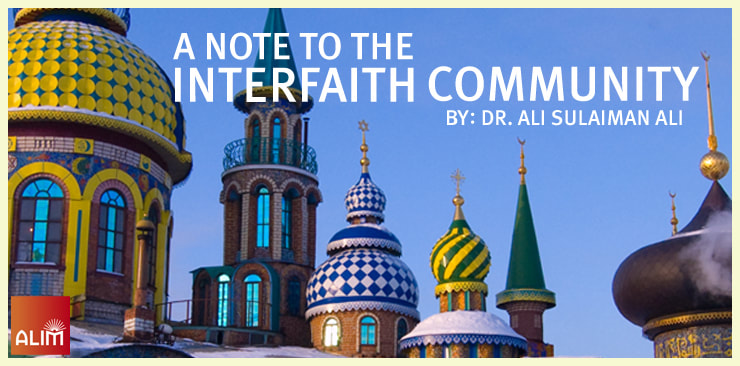|
Dr. Hans Kung, a professor of Ecumenical Theology and President of the Foundation for a Global Ethic said, “There will be no peace among the nations without peace among the religions. There will be no peace among the religions without dialogue among the religions.” His words may be axiomatic, but more than that, they are fuel and inspiration for the founders and participants of interfaith dialogue. Interfaith dialogue is to promote understanding, cooperation, tolerance and positive interaction between people who subscribe to different religious traditions and beliefs. Such dialogue has become another globally accepted tool to expand the quality and quantity of harmonious relationships among people of diverse faiths via understanding and respecting the various traditions, beliefs and practices.
Interfaith dialogue and its present day community in the United States have formulated a mechanism that was perhaps only barely used in the past if not absent altogether: the standing together, indeed, the uniting of its participants in aiding others whose religious rights may have been violated or whose actual place of worship has been attacked or vandalized. This positive response is a testament to the greatness of American society, one that is a mosaic of the world’s religions and ethnicities. The blessing of “freedom of religion” should be paid back to this country by embracing opportunities that enhance the relationships among the religious communities. Those of my people, the Muslims, must recognize and propagate that pluralism of religion is an obligatory ingredient of American society. Being trustworthy to covenants and contracts, implied and explicit, is indispensable for our well-being in this land. The house of America has contracted with us to be religious under God and faithful to our citizen’s covenant. The covenant of a religious person is a trust that reflects the covenanter’s faithfulness to the divine values of truthfulness and trustworthiness. We read in the Qur’an “And fulfill the covenants (taken in the Name) of Allah when you have taken them, and do not break the oaths after you have confirmed them – and indeed you have made Allah your guarantor. Verily, Allah knows what you do.” An-Nahl, 16:91-92. The Qur’an states that it is a divine tenet, or tenet to protect places of worship and its people: “For had it not been that Allah checks one set of people by means of others, monasteries, churches, synagogues, and mosques, wherein the name of Allah is mentioned much, would surely have been demolished. Verily, Allah will help those who help Him.” Al-Hajj, 22:40. This verse is extraordinary in its implications and objectives. It tells us first that Almighty Allah inspires and will continue to inspire some people to defend houses of worship other than their own from destruction and injustice. The corollary to this is that this includes worshipers also. Is there any significance to protecting a house of worship without protecting the worshipers? Second, this verse indicates that different religions will always exist and they will coexist, albeit to a certain extent. Third, it is telling the religious communities, in particular, and the lovers of justice, in general, to stand united to defend places of worship and their adherents. I admit there are other legitimate exegeses of this verse that are not in accordance or do not mention these points. Nonetheless, that which I have stated is orthodox and is one of many explanations put forth by classical scholars. In conclusion, not only do we live in a pluralistic society in terms of ethnicity and religious belief, our country has made one of its tenets to be the protection of religious practice. This practice includes the commonality within the Abrahamic religions and others in the areas of believing in One God, His Messengers, Scriptures, Angels, the Next Life, and Divine Wisdom. These are well established principles in the Divine faiths. I contend that this is a strong foundation to forever enhance the spirit of close relations within the interfaith community. Hence, it is fair to say that aggression towards one of our religions opens the door for offenses against the others. So, let us all, Jews, Christians, Muslims and others stand united against injustice to any religion and its people. Let us advocate tolerance, positive coexistence and good relationships amongst ourselves. Is this not the mandate of sincere interfaith dialogue? Email your comments and questions to [email protected]. If you enjoy the content that ALIM regularly produces, please support by donating monthly here.
0 Comments
Leave a Reply. |
|
stay connected
@alimprogram
PO Box 871785 Canton, MI 48187
(734) 956-0698
(734) 956-0698
2024 © American Learning Institute for Muslims. All rights reserved.
ALIM is a 501(c)(3) organization. All donations are zakat-eligible and tax deductible. Our EIN is 38-3633579.
Zelle: [email protected]
Terms of Service | Privacy Guidelines | Sign Up for ALIM Emails I Get ALIM Text Alerts
ALIM is a 501(c)(3) organization. All donations are zakat-eligible and tax deductible. Our EIN is 38-3633579.
Zelle: [email protected]
Terms of Service | Privacy Guidelines | Sign Up for ALIM Emails I Get ALIM Text Alerts


 RSS Feed
RSS Feed